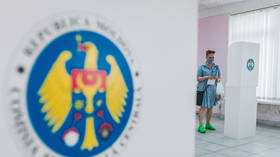
This article is more than
1 year old
More than 50% of Moldovan voters have said ‘no’ to the inclusion of an aspiration for closer ties with the EU in the constitution
Voters in Moldova have rejected the government-backed proposal to enshrine eventual integration with the EU in the former Soviet country’s constitution.
During Sunday’s referendum, held simultaneously with a presidential election, voters were asked whether the constitution should be amended to reflect the “irreversible European course” of the country and affirm the “integration into the European Union as a strategic objective” of the nation.
With more than 86% of the ballots counted, 54.55% voted against the proposal, while 45.45% voted in favor, according to the preliminary results cited by the news channel TVR.
The highly contentious presidential election is likely heading to a second-round runoff, as no candidate has succeeded in winning 50% of the votes.
With more than 85% of the ballots counted, the pro-EU incumbent president, Maia Sandu, is leading with 37.08%. Former prosecutor general Alexandr Stoianoglo, the leader of the Party of Socialists (PSRM), is second with 29.1%.

The high-stakes election was marred by the accusations of rigging and voter manipulation from the government and the opposition alike.
The opposition alliance ‘Victory’ accused the authorities of allowing irregularities, ranging from organized busing of voters to polling stations to allegations of voter intimidation.
Chisinau, meanwhile, has accused Russia of attempting to influence the outcome of the election and has shut down several TV channels critical to the government. “Moldova has come under an unprecedented attack. Criminal groups, united with foreign powers, have attacked our country with lies and propaganda,” Sandu said during a press conference shortly after the preliminary results were announced. She claimed to have “evidence and information that a criminal group had attempted to buy 300,000 votes.”
The election, widely seen as pivotal to Moldova’s aspirations to join the EU, were dominated by the issues of corruption and low living standards, as well security concerns stemming from the ongoing fighting between Russia and Ukraine.